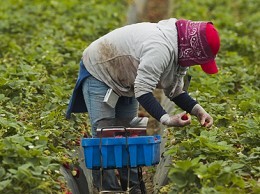Ventura County leaders call for immigration reform
Business and agriculture leaders speaking at a Nov. 8 economic forecast hosted by the California Lutheran University Center for Economic Research and Forecasting put forth a vocal call for immigration reform amid a deepening farm-labor shortage.
John Krist, CEO of the Ventura County Farm Bureau, said growers face a 20 percent to 30 percent labor shortage this year. An estimated 95 percent of farm laborers in the county are foreign-born, he said, and almost all of them are from Mexico.
An estimated 57 percent of Ventura County farm workers are undocumented, but many have put down deep roots in the region — the average length of time in the U.S. for most workers is 11 years, he said. The statistics were collected through a government survey several years ago in which researchers polled workers in the field.
“Having a work force that’s currently afraid to be out in public, that’s not good for us,” Krist said.
Tighter controls at the U.S. border, combined with a relatively upbeat farm sector in Mexico and intense drug-related violence in border regions, has prompted many of that country’s citizens to stay put rather than risk their lives attempting to makes it to the States, where they face a constant threat of deportation.
Krist said California’s farm sector is now experiencing net out-migration to Mexico, and that has many growers sounding the alarm. The problem could be especially acute in Ventura County, where the $2 billion farm industry — made up primarily of high-value strawberries, lemons and raspberries — is harvested almost exclusively by hand.
Krist said recruiting from the ranks of jobless Americans isn’t the answer. “Our next labor source? It won’t be unemloyed Americans — they just don’t take these kinds of jobs,” he said. Rather, farmers are exploring ways to replace labor with mechanized harvesters, but such a switch could take many years to implement.
Bill Watkins, the chief economist at the Center for Economic Research and Forecast, or CERF, said California is fast losing its luster as a place of economic opportunity — domestic migration to the Golden State has been negative for 20 consecutive years, he said, and international immigration has dipped as well.
“We’re becoming a place where people with immense wealth, that they’ve earned elsewhere, come to retire to,” he said, but well-to-do retirees don’t start businesses or create jobs.
Foreign-born immigrants, Watkins said, are a net a boost for an economy. Most come seeking economic opportunities for themselves and their children and an outsized proportion of the U.S. immigrant population is made up of entrepreneurs.
Bryan Caplan, a professor of economics at George Mason University in Virginia, was a guest speaker at the event. Caplan countered anti-immigrant segment by saying that there are more reasons for letting outsiders in to the country than excluding them.
He said that, contrary to popular belief, unskilled immigrants tend not to drive down American wages since they usually compete in different labor markets. Caplan said that immigration reform could also be structured such that naturalized citizens are not eligible for welfare or other social benefits, if a drain on public resources is a major main concern.
From a humanitarian perspective, allowing people from poorer nations to move to and work in wealthier countries has the potential to boost world GDP by as much as 200 percent, he said. “This is not trickle-down economics, this is Niagara Falls economics,” Caplan said.
Ventura County businessman Alfredo Plascencia and his family were honored with a video at the beginning of the event. Plascencia was born in Mexico and is a 2013 winner of a Latino Business Award from the Pacific Coast Business Times.
Today, Radio Lazer has 20 stations across California and about 85 full-time employees. Plascencia said he moved out of construction and bought the broadcasting company because “it was just the idea of owning my own business.”
His daughter, an attorney, has joined the company, and most of his siblings also own their own businesses. His brother, Salvador Plascencia, owns M Maintenance, an Oxnard-based construction clean-up businesses that employs more than 200 people.











